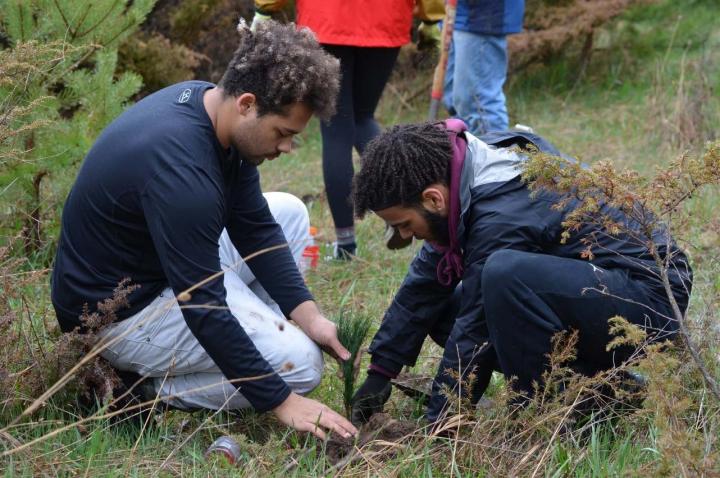
Credit: Nicole Matson
NEW YORK (January 14) — A new study co-authored by researchers from the Wildlife Conservation Society’s (WCS) Global Conservation Program and the University of British Columbia (UBC) Faculty of Forestry introduces a classification called Resistance-Resilience-Transformation (RRT) that enables the assessment of whether and to what extent a management shift toward transformative action is occurring in conservation. The team applied this classification to 104 climate adaptation projects funded by the WCS Climate Adaptation Fund over the past decade and found differential responses toward transformation over time and across ecosystems, with more transformative actions applied in forested ecosystems.
The RRT classification addresses a continuum from actively resisting changes – in order to maintain current or historical conditions–through accelerating ecological transitions through approaches such as translocating species to new areas. Results show a shift from more resistance-type actions to transformative ones in recent years. Most transformation-oriented projects involved translocation of trees or other plants, commonly in forest ecosystems, with exceptions including, for example, translocating seabird species to habitat where they may be more likely to survive. Other ecosystems with more transformative projects occurred in coastal aquatic and urban/suburban ecosystems.
Unprecedented environmental changes such as increased frequency and severity of heatwaves, droughts, storms, heavy rainfalls, and wildfires, have degraded ecosystems, disturbed the economy, and led to the loss of lives and livelihoods. Conventional conservation strategies may be ineffective in dealing with changing environmental conditions: wildfires could decimate protected old-growth forests and endangered species, and coastal conservation easements could become inundated by rising seas. Novel conservation actions aimed specifically at helping ecosystems adapt to the mounting impacts of climate change contrast with approaches that aim to maintain current or historical conditions. Transformative actions, such as species translocation, were once more controversial than they are today; they are now increasingly highlighted as necessary components of conservation in an effort to implement projects that are more robust to future climates. However, few studies have systematically examined on-the-ground conservation adaptation projects to assess the extent to which such transformational adaptation actions are being implemented, through what approaches, and in what ecosystems.
This study, published in Nature Communications Biology, assessed projects implemented within the United States but the authors see broader applications. “Our classification could be applied to a suite of conservation projects across the world to determine if a global shift in practice is occurring,” said co-author Lauren Oakes, a Conservation Scientist at WCS and Adjunct Professor at Stanford University. Guillaume Peterson St-Laurent, the lead author and a postdoc at the University of British Columbia, says the team is interested in creating an online platform for tracking projects assessed with the new classification around the globe. “We hope to be working with international teams in the not-so-distant future as we envision this new tool could be applied to many different ecological scenarios,” says Peterson St-Laurent.
The interdisciplinary research team was supported by the Doris Duke Charitable Foundation, and the study was conducted in partnership with the IUCN Species Survival Commission’s Climate Change Specialist Group.
Precautionary actions aimed at resistance or resilience–such as protecting intact ecosystems–are incredibly valuable in the suite of responses needed to address current and future climate change. But the authors suggest that degraded ecosystems or working landscapes may require more transformative actions and the public support to do so, in an effort to meet the shifting goals in a changing climate. This research provides evidence of a paradigm shift, as practitioners and funders move more in this critical direction.
###
About the Wildlife Conservation Society
WCS saves wildlife and wild places worldwide through science, conservation action, education, and inspiring people to value nature. To achieve our mission, WCS, based at the Bronx Zoo, harnesses the power of its Global Conservation Program in nearly 60 nations and in all the world’s oceans and its five wildlife parks in New York City, visited by 4 million people annually. WCS combines its expertise in the field, zoos, and aquarium to achieve its conservation mission. Visit: newsroom.wcs.org Follow: @WCSNewsroom. For more information: 347-840-1242.
About the Doris Duke Charitable Foundation (DDCF). The mission of the Doris Duke Charitable Foundation is to improve the quality of people’s lives through grants supporting the performing arts, environmental conservation, medical research and child well-being, and through the preservation of the cultural and environmental legacy of Doris Duke’s properties. The foundation’s Environment Program seeks to enable communities to protect and manage wildlife habitat and create efficient built environments. An awareness of climate change as the greatest emerging threat to biodiversity–and the need to aggressively mitigate it without unnecessarily sacrificing wildlife habitat–shapes the Environment Program’s grant-making priorities. In addition to funding researchers from the WCS Global Conservation Program, DDCF also funds the WCS Climate Adaption Fund. For more information, visit ddcf.org.
About the University of British Columbia’s (UBC) Faculty of Forestry. UBC’s Faculty of Forestry is a global leader in forestry education and research. What began in 1921, today embodies a comprehensive offering of undergraduate and graduate programs as well as world-renowned research and initiatives. Our programs and research draw from all forest science disciplines and model the broad spectrum of topics relating to forests’ interplay between our environment and all those who live on our planet. For more information, visit forestry.ubc.ca/news/media-centre.
About the IUCN SSC Climate Change Specialist Group
The IUCN SSC Climate Change Specialist Group is a global network of scientists working at the research-policy-practice interface to strengthen nature conservation in a changing climate. With more than 60 members worldwide, we work at the forefront of climate change and biodiversity science to bridge knowledge gaps, build collaborations, and strengthen the community of practice around climate-focused conservation. Learn more at ccsg-iucn.com or follow us on Facebook (IUCN SSC Climate Change Specialist Group) or Twitter (@IUCN_CCSG).
Media Contact
Stephen Sautner
[email protected]
Original Source
https:/
Related Journal Article
http://dx.




